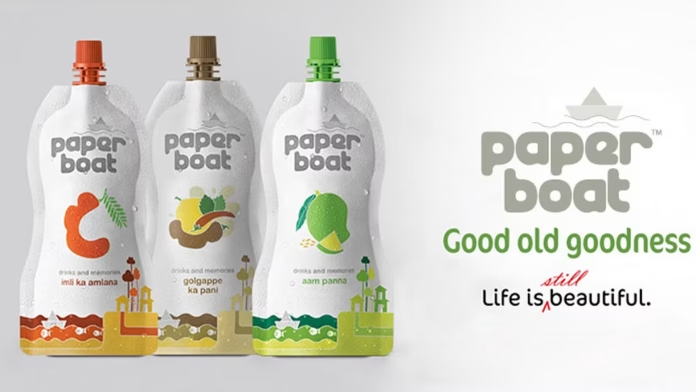Paper Boat is a popular Indian brand that has pioneered the traditional drinks category in India. Launched in 2013, the brand has captured the hearts of millions of Indians by reviving forgotten traditional Indian beverages and presenting them in an innovative, modern, and convenient way.
Paper Boat is a brand owned by Hector Beverages Pvt. Ltd, founded by Neeraj Kakkar and James Nuttall in 2010. Neeraj Kakkar, an IIM-A graduate, had previously worked with Coca-Cola and saw an opportunity in the market for traditional Indian beverages. He realized that while many Indians were fond of traditional drinks, these drinks were not easily available in a convenient and appealing format. That’s when he decided to launch Paper Boat, intending to revive the traditional drinks category in India.
Paper Boat produces and markets traditional Indian beverages and foods. Initially introduced in single-serving flexible pouches, Paper Boat offers a variety of traditional Indian beverages such as Aam Panna, Jaljeera, and Aam Ras. The brand has now expanded to include one-litre Tetra Pak cartons.
Paper Boat started to focus on the ethnic drinks segment and launched its fruit pulp-based beverage brand in March 2013, to bring traditional Indian drinks into the modern context. In 2016, Paper Boat diversified its product line by introducing peanut chikki in the traditional food segment. This move was in line with their brand philosophy of offering ethnic Indian snacks in modern packaging. Additionally, in 2020, the company collaborated with Accenture to expand its product offerings and provide more authentic tastes.
The brand’s focus on nostalgia and tradition has helped it to become a leading player in the Indian beverage market. Paper Boat strives to maintain the authenticity of traditional recipes while incorporating innovation to cater to the urban market. Additionally, their products are free from artificial colouring and preservatives.
Paper Boat’s success has also inspired other companies to enter the traditional drinks market and experiment with new flavours and recipes, which has led to growth in the category as a whole. Paper Boat’s focus on quality ingredients, innovative packaging, and storytelling has helped it create a strong emotional connection with consumers, making it a beloved and iconic brand in India.
Pioneering the Traditional Drinks Category
Paper Boat started with a range of traditional Indian drinks like Aam Panna, Jaljeera, and Kokum. These drinks were made with natural ingredients and presented in a unique, convenient, and appealing packaging. For example, Aam Panna was packaged in an aseptic tetra pack that looked like a miniature version of the traditional earthen pot in which the drink is usually served. This innovative packaging not only made the product convenient to carry and consume but also made it stand out on the shelves.
Paper Boat has a diverse range of fruit-based ethnic drinks, including Jal Jeera, Aam Panna, Aam Ras, Alphonso Aam, Jamun Kala Khatta, Chilli Guava, Nimbu Pani, Kokum, Neer More, Kanji, Sugarcane juice, Lychee Ras, Apple and Orange. Additionally, it offers milk-based beverages like Neer More, Butter Milk, Badam Milk, and Thandai. In 2018, the brand also introduced Coconut Water to its product line.
Another key aspect that helped Paper Boat pioneer the traditional drinks category was its storytelling. The brand’s marketing campaigns focused on the nostalgia associated with these traditional drinks and how they evoke memories of childhood, family, and festivals. The brand used social media platforms like Facebook and Instagram to engage with its target audience and create an emotional connection with them.
Paper Boat has not just pioneered the category but has opened the opportunities for a brand using multiple strategies. The following are few strategies of paper boat that stood to be a case studies within themselves:
1. Innovation in Packaging: Paper Boat’s packaging is one of the key elements that helped it succeed. The brand’s packaging is not only convenient but also evokes a sense of nostalgia and tradition. The packaging reinforces the brand’s message of reviving traditional Indian beverages and makes the product stand out on the shelves.
2. Emotionally Connected Storytelling: Paper Boat’s marketing campaigns focus on the emotional connection that consumers have with traditional Indian beverages. The brand’s storytelling evokes memories of childhood, family, and festivals, and this emotional connection has helped Paper Boat build a loyal customer base.
3. Focus on Quality: Paper Boat focuses on using natural ingredients and high-quality production processes. This focus on quality has helped the brand gain the trust of its customers and build a positive brand image.
4. Social Media Engagement: Paper Boat uses social media platforms like Facebook and Instagram to engage with its target audience and create an emotional connection with them. The brand’s social media campaigns are visually appealing and reinforce its message of reviving traditional Indian beverages.
Paper Boat has had a significant impact on the traditional drinks category in India. It has revived forgotten beverages and introduced them to a new generation of consumers. The brand has also inspired other players in the market to launch their traditional drink products. Paper Boat has become a beloved brand in India and has won several awards for its innovative approach to product development and marketing.
Paper Boat’s success in pioneering the traditional drinks category in India is a testament to the power of preserving cultural heritage through innovative business strategies. By offering authentic, traditional Indian drinks in modern, convenient packaging, the brand has been able to connect with consumers across generations and demographics. As the brand continues to expand its offerings and partnerships, it has become a symbol of India’s rich cultural heritage and entrepreneurial spirit in the food and beverage industry.





